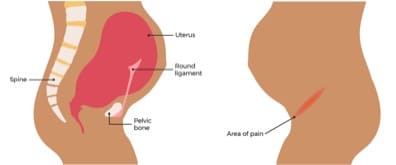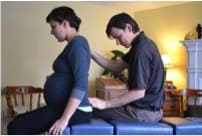Round Ligament Pain
14
July
2021

Round ligaments link the front part of the uterus to the groin. Almost 10 to 30% of women experience round ligament pain during their pregnancy, according to Healthline (2019), and it usually occurs at the beginning of the second trimester (12 weeks). In fact, when pregnant, a women’s round ligaments stretch and go from being round and thick to long and extended. The discomfort is usually located on their right side but some women experience pain on both sides. In this case, the pain is usually worse on one side than on the other.
The pain is temporary and is triggered by some actions that lead the ligaments to tighten abruptly and to pull on the nerve fibers.
What are the symptoms of round ligament pain?
Symptoms of round ligament pain include stabbing pain around your baby bump, lower back pain and cramping.
What actions trigger round ligament pain?
Women describe round ligament pain as a discomfort that comes and goes, but the pain worsens with sudden movements such as standing up, coughing, or sneezing and laughing.

How long does round ligament pain last?
The pain usually lasts a few seconds. However, as we all know, pregnancy symptoms are different for each woman. Therefore, some women experience round ligament pain for hours.
How is round ligament pain diagnosed?
When at your appointment, your doctor will probably ask you some questions about your symptoms. A physical test is often helpful to make sure the pain you’re feeling is due to the ligaments and to rule out any other diseases. The doctor may also ask for a urine sample to make sure you don’t have any urinary infections, an ultrasound to rule out a miscarriage and a complete blood count that can detect anemia and infections. Some doctors will also evaluate your pain levels with a pain scale to make sure the discomfort you’re experiencing is normal and not too severe.

When to see a doctor?
It’s easy to confuse pain in your abdominal area and to assume it’s round ligament pain. Therefore, it’s necessary to see a doctor when the pain is severe and when you experience any of the symptoms listed below:
Cramping
Fever
Lower back pain
Vaginal bleeding
Pain when urinating
Pressure in the pelvic area
These symptoms might be indicating other severe conditions such as kidney stones, appendicitis, urinary infections or preterm labor and might require immediate care.
Therefore, seeking professional help whenever you feel like the pain is unusual and abnormal is essential.
As Dr. Friedman said “sometimes it’s absolutely nothing to worry about” but “anything that’s persistent” is worth checking.
Which doctor to see?
The greatest thing you can do is see your OBGYN. Since you’re pregnant, they’re already aware of your medical history and will know how to guide and reassure you.
Some home treatments to help ease round ligament pain
-
Rest
Resting is the key to avoid pain during your pregnancy. When feeling round ligament pain or any pain in general, stop what you’re doing and rest for a little while.
-
Avoiding sudden movements
Since sudden movements are the origin of round ligament pain, try working on moving carefully. While you can’t control your ligaments, you can try to do your best and make sure your movements are gradual and slow.
-
Keep your posture straight
Keep your body aligned while sitting and avoid leaning on one side or back.
Tip: sitting on an exercise ball improves your posture, eases your back pain and builds up your stomach and back muscles. -
Prenatal yoga
Prenatal yoga improves sleep, increases flexibility and strength and reduces stress. Practicing pregnancy yoga as often as possible, with the approval of your OB-GYN can be a great way to de-stress and stay fit during your 9 months. However, you should be aware of the risks that prenatal yoga comes with. Consult your doctor, take it slowly, and pay attention to your body. There are also certain postures you should avoid including lying on your belly or your back.
-
Put up your feet
If you have swollen or painful feet or feel round ligament pain when standing up, put them up while sitting or sleeping to relax them and reduce the pain.
-
Flex your hips before coughing or sneezing
-
Massage the painful areas
Round ligament pain comes from tight ligaments pulling on other body parts. Applying gentle pressure with your fingertips on the groin and uterus up towards your stomach may release some tension and pain.
-
Swimming
Swimming increases oxygen levels in your body and improves blood circulation. The water releases pressure and supports your ligaments. It’s also a great way to exercise.
-
Exercising
Some women are scared of moving their bodies during their pregnancy, especially when experiencing round ligament pain. However, some exercises have been proven to help relieve the pain. Cat-cow, pelvic tilts and the savasana pose are 3 exercises that especially alleviate round ligament pain. Don’t hesitate to get a pregnancy trainer’s advice to ensure your and your baby’s safety.
-
Maternity belts
Maternity belts wrap around your lower back and abdomen and help ease pressure on your back and pelvis. As Dr. Drunmyre said, pregnancy belts “can help support the uterus” and “help pull the baby off the pelvis” which will automatically ease your round ligament pain. Pregnancy belts are especially useful for women on-the go.
-
Warm baths
Warm baths are natural methods to help your body relaxed and unwind. Adding salts, essential oils or even bath bombs is beneficial and help your body – and ligaments – relieve stress.
-
Chiropractors
Chiropractors are specialists every pregnant woman should visit when experiencing any sort of pain. For round ligament pain, chiropractors have special techniques that prevents the uterus from twisting.
-
Pain relief medication
While medication is not necessary for round ligament pain, for some women: their doctors counsel them to use pain relievers because they are in agonizing discomfort. If none of these at-home cures work, see a physiotherapist. He or she may have alternative options that are more appropriate for your situation.


Who is most likely to get round ligament pain?
Women at the start of their second trimester should expect to get round ligament pain. Pregnant women with twins or triplets are more likely to feel round ligament pain.
How to sleep better when experiencing round ligament pain?
Resting is an essential part of pregnancy. Doctors recommend that pregnant women sleep 8 to 10 hours a night. Due to the hormonal changes that occur in your pregnant body as well as the increase of progesterone levels, you might feel the need to sleep all day! However, round ligament pain keeps some women from sleeping at night. As we’ve previously explained, sudden movements trigger round ligament pain. And while you’re asleep, you might roll to your side without noticing, causing your ligaments to tighten. Therefore, the best way to sleep is to place pillows behind your back, forcing you to sleep on your side and preventing you from rolling on your back. Tip: Pregnancy pillows in U or C shapes are very effective. They help you find a comfortable sleeping position while supporting your stomach and preventing you from rolling in your sleep.

Frequently asked questions
-
Is it normal to feel round ligament pain?
During pregnancy, ten percent to thirty percent of women develop round ligament pain. It is completely normal and, for some women, unavoidable to go through this pain.
-
Can I prevent round ligament pain?
There’s nothing you can do to prevent round ligament pain from happening. Your ligaments are stretched when you’re pregnant and they are going to inevitably hurt when you make unexpected movements.
-
Is it cramps or round ligament pain?
Round ligament pain and stomach cramps generate similar forms of pain and are positioned in the same area of the belly. The only difference between the two is how the pain starts. Round ligament pain occurs when you abruptly adjust your position and lasts a short time, but stomach cramps last a long time.
-
Can I get round ligament pain without being pregnant?
It’s very unlikely and rare that non-pregnant women feel round ligament pain. If so, a doctor’s consultation is highly recommended, in order to determine if something unusual is occurring.
-
Do I continue to experience round ligament pain after giving birth?
The answer to this question is: Maybe. Since every woman is different, you might still feel round ligament pain after giving birth, even though it’s unlikely. If you experience round ligament pain post-partum, it definitely won’t be caused by sudden movements of the pelvic.
If you or anyone you know is suffering from pain, call us today on (469) 562 4188 to book an appointment with our expert doctors.